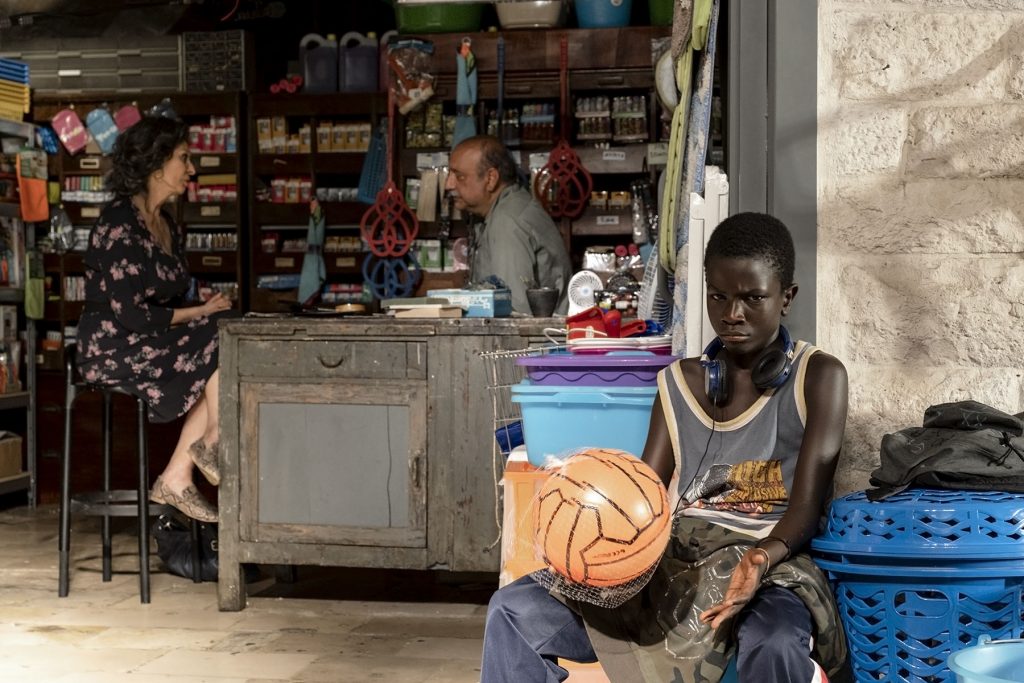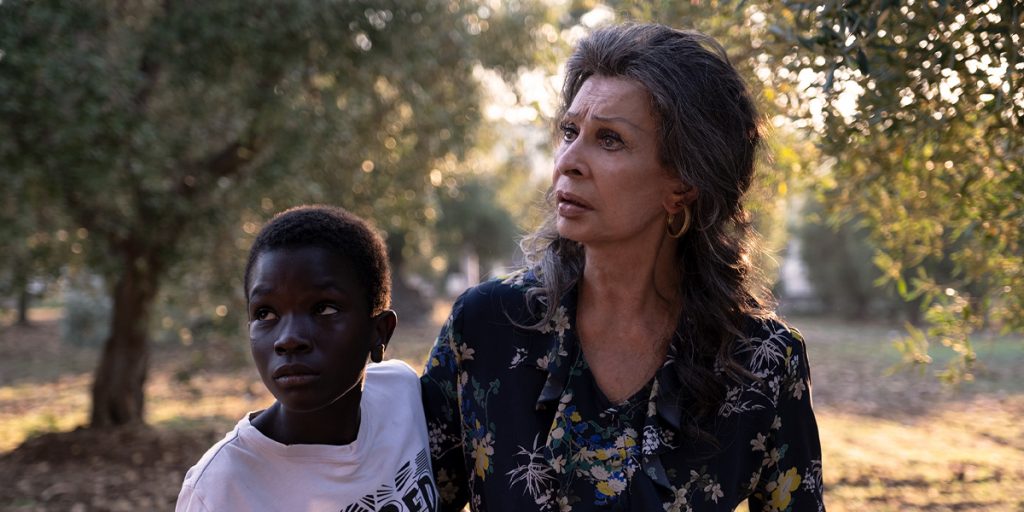The Life Ahead serves as Sophia Loren’s heartfelt and high-spirited homecoming to film, and she is a fervent and fiery force to behold.
Simply put, Sophia Loren is a legend of the silver screen, through and through. The widely acclaimed Italian actress, who was named as the 21st greatest female star of Classic Hollywood Cinema by the American Film Institute over two decades ago, initially made history in the industry in 1961, when she became the first actor or actress to win an Oscar for a foreign-language performance for her work in Vittorio De Sica’s Two Women. From there, she went on to receive five special Golden Globes, a BAFTA award, the Volpi Cup for Best Actress at the Venice Film Festival, the Best Actress Award at the Cannes Film Festival, and even an Academy Honorary Award for her lifetime achievements. Truly, the titanic talent of this thespian cannot possibly be overstated. Following her supporting role in Rob Marshall’s 2009 musical drama Nine, Loren stepped away from cinema for quite some time, but now, 11 years later, she makes her rapturous return to film in her son Edoardo Ponti’s (Between Strangers, Coming & Going) The Life Ahead, showing audiences around the world that she hasn’t lost an ounce of her skillful showmanship in her absence.
The Life Ahead – an adaptation of Romain Gary’s 1975 novel The Life Before Us – tells the tale of Madame Rosa, an aging Holocaust survivor and former prostitute who now runs a shelter for the children of other women who currently “work the streets,” and Momo (newcomer Ibrahima Gueye), a young Muslim boy who lost his mother years prior and now makes a living dealing drugs on behalf of a local trafficker. Their paths chaotically collide one day in a market on the Italian seaside, when Momo snatches Madame Rosa’s purse, which holds two costly candlesticks that Rosa intended to sell to earn money for a month’s rent. When Momo’s guardian, Dr. Coen (Renato Carpentieri, of Puerto Escondido and Tenderness) – a man who also happens to be Rosa’s personal physician – learns of Momo’s transgression, he wastes no time taking him to the Madame to apologize and return what he has stolen. Upon entering Rosa’s refreshing refuge, Dr. Coen consequently comes up with an idea for Momo’s future as well – he could become another one of Rosa’s “wards,” learning lessons about responsibility and respect that the doctor is sadly too busy to teach him on top of his day job.
Naturally, Rosa originally (and ostentatiously) opposes the doctor’s proposal. In her eyes, she’s far too old to deal with this delinquent’s discourtesy. However, Rosa eventually caves under further consideration, while still asserting that Momo will act with honor in her household. Nevertheless, right off the bat, the two continually clash due to their painfully conflicting personalities; even aside from their obvious cultural and religious contrast, Rosa is a weathered and world-weary older woman who can hardly relate to, let alone control, a combative and cantankerous child prone to antagonistic outbursts of anger like Momo, which seemingly stunts this new set-up as soon as it begins. And yet, as time goes on, these two emotionally impaired individuals – with equally painful pasts – start to sense that they are not alone in their suffering, and together, they may just be able to move past their respective tragedies and traumas.

The Life Ahead feels tailor-made for a straightforward and severely sentimental style of storytelling, but Ponti, who also co-wrote the script with screenwriter Ugo Chiti (Dogman, Gomorrah) treats the subject matter with softness and subtlety, never taking the easier (and more emotionally manipulative) approach to excessively emphasize the horror and hardship at the heart of this narrative. This parable is no mere “poverty porn,” as, opposed to solely showcasing Rosa and Momo’s substandard surroundings, Ponti instead focuses in on the feeling and fervor of their burgeoning friendship first and foremost, allowing his characters to stand apart from the world in which they live.
Though Rosa and Momo have been immensely impacted by their beggared backgrounds, they are more than the woes they have withstood, and this is thanks to Ponti’s careful and considerate characterization. Ponti deserves additional commendation for crafting Rosa’s amiable abode in a way that is authentic to her societal standing while also remaining warm and welcoming, never seeming like a stereotypical “slum” in any capacity. This is an excellent example of Ponti’s tender thoughtfulness throughout all of The Life Ahead, which makes the chronicle all the more convincing and compelling.
As the magnanimous Madame Rosa, the lively Loren is utterly luminous, and her sumptuous screen presence suffuses each and every one of her scenes with a stirring spirit. Her persuasive performance is a multifaceted marvel, beautifully balancing a surplus of sentiments at all times without ever allowing any one emotion to overwhelm Rosa’s overall expression as a character. This is a woman who has seen the cruelest capabilities of humanity first-hand, and while she actively and openly displays that dolor in her everyday disposition, she is just as adept at advertising openhearted optimism at the same time, encouraging the children she looks after to never lose hold of hope, despite all the evil she has personally endured. And, even though Madame Rosa may feel particularly fiery whilst familiarizing herself with Momo, she again cannot be dismissed as some mere “embittered elder,” as there is always an explanation for her exasperation, and Loren refuses to relegate Rosa to any single limiting label. Loren’s most moving moments in the role manifest in the soaring second half of The Life Ahead, as Rosa battles ailments associated with aging and makes do with a debilitating memory disorder, and it is these sequences that stick with you long after the credits roll. Altogether, Sophia Loren couldn’t have asked for a more heartfelt and high-spirited homecoming to cinema than The Life Ahead, and we couldn’t be happier to have her back.
In his dazzling big-screen debut, Gueye handily holds his own opposite Loren – a tremendous task given her commanding cinematic cachet – and he expertly elevates what could’ve been a clichéd “ornery orphan” character by counteracting Momo’s consternation with an honest hurting that Rosa delicately disentangles. It’s clear from the get-go that Rosa is meant to represent the “motherly” figure he’s been missing in life, but Gueye exhibits this emotional evolution in a way that feels engaging in spite of its inevitability, and that is no small feat. His progression from the first frame to the last is leisurely revealed, making it all the more legitimate, as his road to recovery isn’t accomplished overnight. Aside from Gueye, Carpentieri is a pleasing personality as the distinguished and devoted Dr. Coen, while trans actress Abril Zamora (Who Would You Take to a Deserted Island?, Nuestra Calle) is a darling delight as the mother of one of the children Rosa looks after, punctuating the proceedings with pep and panache whenever she turns up.
The Life Ahead is a simple story, sweetly told, with a writer-director in complete control of his tender tone and an astoundingly accomplished actress at the top of her game, even after years away from her art. For all the ups and downs explored throughout the entirety of The Life Ahead, there is an uplifting undercurrent that reminds audiences of the assurance that we are more than our troubles and tragedies, and honest human connection can hold the key to our resonant resurgence. Through bona fide and forthright friendship with those who candidly comprehend our anguish, we can begin anew.

